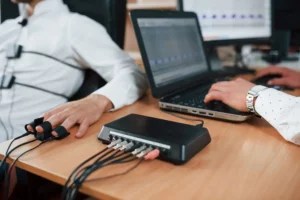When it comes to screening individuals for high-security positions, the CBP (Customs and Border Protection) agency is one of the many organizations that rely on polygraph testing. It’s been used for many years as a method of detecting lies and ensuring that individuals are suitable for the position they’re applying for.

The CBP began using polygraphs as part of their pre-employment screening process in the 1980s. The initial adoption of the test was largely driven by the perceived need to enhance national security by rooting out potential individuals who could pose a threat to the United States.
Since then, the test has gone through several changes, including modifications to the procedure, the scoring system, and the training of examiners.
This article aims to provide you with an accurate explanation of the CBP polygraph, its format, and its purpose. You’ll learn what to expect, what types of questions may be asked, and how the test is scored.
What is the CBP polygraph test?
The CBP hiring process is highly competitive, and the agency places a premium on ensuring that its employees are trustworthy and have the ability to make sound decisions under pressure. The polygraph test is used to assess suitability for a number of positions, including border patrol agents, customs and border protection officers, and air and marine interdiction agents.
A trained examiner will ask you a series of questions, some of which may be personal or sensitive in nature, and will be looking for changes in your physiological responses that may indicate deception.
The test typically lasts between two and four hours and is divided into three parts. The first part involves a pre-test interview, in which you’ll be asked about your background and the position you’re applying for. The second part is the actual test, in which you will be hooked up to the polygraph machine and asked a series of questions. The third part is the post-test interview, and here the examiner will review your results with you.
It is not a standalone tool for assessing an applicant’s suitability for high-security positions. but just one part of a larger screening process that may include a background check, drug test, medical exam, and other assessments.
Importance of the test
CBP officers are responsible for protecting the United States from various threats. These positions often require a high level of trust, and the CBP needs to ensure that its officers are honest, reliable, and capable of handling the job.
Research has shown that the polygraph is a highly effective tool. In fact, a study conducted by the National Academy of Sciences found that, when used properly, it is accurate at a rate of 88% to 98%. This means that the CBP can have a high level of confidence in the results and the applicants they accept.
Types of CBP polygraph questions with examples

One type you may encounter is called a “control question.” These are designed to establish a comparison (baseline) for your physiological responses. Control questions may be something like, “Have you ever lied to get out of trouble?” or “Have you ever taken something that didn’t belong to you?” They are meant to be somewhat ambiguous, and most people have probably done something similar in their lives. The idea is that your body’s response to these should be similar to your response when actually lying, so the examiner can tell when you are dishonest or telling the truth.
Another type is called a “relevant question.” These are directly related to the matter being investigated. For example, if you are applying for a job as a border patrol agent, you may be asked questions like, “Have you ever knowingly hired an illegal immigrant?” or “Have you ever smuggled drugs across the border?” They are more specific than control questions and are meant to determine if you have any relevant knowledge or experience that might make you a risk to national security.
Finally, you may encounter “irrelevant questions.” These are not at all related to the matter being investigated but are included to also establish a baseline for your physiological responses. Irrelevant questions may be something like, “Is today Tuesday?” or “Do you have a dog?” They are meant to be easy to answer truthfully and to give the examiner a sense of what your responses look like when you are not nervous at all.
Question topics typically include:
- Personal history, such as employment history and drug use.
- Criminal activity, such as theft or fraud.
- Associations with foreign nationals or organizations.
- Previous involvement with law enforcement or security agencies.
The questions during the polygraph will vary depending on the job you are applying for and the specific matter being examined. The examples given here are just meant to provide a general idea of the types you may encounter. It’s also worth noting that the examiner will likely ask follow-up questions to clarify your responses.
Duration of the test
The length can vary depending on the type of position being applied for and the complexity of the questions asked. Typically, a polygraph exam for a CBP position can take anywhere from 2-4 hours, but some may last longer.
The actual polygraph assessment can take between 60 and 90 minutes to complete; the examiner might ask a series of questions multiple times to ensure accuracy and that the results are consistent. In addition, he may need to clarify or follow up on certain answers, which can extend the duration of the exam.
How to prepare for the CBP polygraph

1.Get plenty of rest the night before
Make sure you get plenty of rest. A well-rested mind and body can help you stay focused and calm during the test.
2.Follow instructions carefully
Make sure you understand the instructions before the test begins, and follow them carefully. The examiner will likely go over them with you beforehand, but don’t be afraid to ask questions if anything is unclear.
3.Relax prior to the exam day
The polygraphcan be a stressful experience, so it’s a good idea to enjoy relaxation exercises such as deep breathing or meditation in the days leading up to the test. They can help you stay calm and focused and reduce anxiety.
4.Review the job requirements and your application
Before the screening, review the job requirements and your submission to make sure you understand the expectations of the position and have a clear understanding of your own qualifications. This can help you feel more confident and prepared during the test.
5.Be honest about any concerns or issues
If you have any doubts or difficulties that you think may come up during the polygraph, be honest about them with the examiner. This can help you address any potential problems before it begins and may help put your mind at ease.
Common mistakes to avoid
Individuals frequently make mistakes that affect their results. Avoid these:
- Not telling the truth: This may seem obvious, but lying during the test is the surest way to fail it. Trying to deceive the examiner in any way is likely to be detected by the machine and will be viewed as a major red flag.
- Overthinking the questions: It’s natural to feel nervous, but overthinking can lead to inconsistent or confusing answers. Instead, try to focus on the specific question being asked and give an honest answer based on what you know.
- Focusing too much on physiological responses: While it’s true that physiological responses such as heart rate and breathing can be indicators of deceit, they can also be influenced by other factors such as anxiety or stress. Focusing too much on trying to control these can actually make them more noticeable to the examiner.
- Not disclosing relevant information: One of the main goals of the test is to uncover any relevant information that you may not have disclosed during the background investigation. Failing to mention any relevant information can raise suspicions, and even result in disqualification from the application process.
- Not taking the test seriously: While it’s important not to overthink the questions or become too nervous, it’s also important to take the test seriously and give it your full attention. Treating the test casually or making jokes can be seen as a lack of respect for the process and could also raise concerns.
Tips for passing the CBP polygraph
- Avoid caffeine and other stimulantsbefore the exam, as they can increase anxiety and interfere with results.
- Stay hydrated to help maintain focus and concentration.
- Speak clearly and confidently. Don’t be afraid to ask for clarification if you don’t understand a question.
- If you are unsure of an answer, say so. It is better to admit uncertainty than to provide false information.
- Stay calm. High levels of nervousness and anxiety can also affect the results.
- Wear comfortable clothing on the day of your exam. Tight or restrictive clothing can be distracting and uncomfortable, which may affect results.
What Is the Pass Rate?
The success rate for the CBP polygraph varies depending on the time period and location of the test. According to a report from the Department of Homeland Security’s Office of Inspector General, the overall passing rate in fiscal year 2016 was 60%. However, it differs between the different CBP sectors, with some sectors having a higher rate than others.
Can you retake the test if you fail?

If you fail, you may be given the opportunity to retake the test. However, the decision to allow a second inspection ultimately rests with the CBP. The specific policies and procedures may vary again by location and situation.
In general, you will need to wait a certain amount of time before you are eligible. The length can vary, but it is normally at least a few months. During this time, it isrecommended that you undergo additional counselingto address any issues that came up during your initial exam.
Even if you are allowed to retake it, that does not mean that you will necessarily pass. If you failed the first time, it’s likely that there were issues with your responses that willneed to be addressedbefore you can pass.
Common Misconceptions
There are a number of assumptions about the test that can make the process seem more intimidating than it actually is:
Misconception #1: The polygraph test is infallible and always accurate.
Contrary to some beliefs, it is not 100% accurate. While it is a useful tool, it is not foolproof. The accuracy can be affected by a number of factors, including the skill and experience of the examiner, the specific questions asked, and your physiological responses.
Misconception #2: You can “beat” the polygraph by manipulating your physiological responses.
Some people believe that they can manipulate reactions to “beat” the test. However, this is simply close to impossible. While it is possible to control your breathing or heart rate to some extent, the examiners are trained to detect such attempts and can usually identify them.
Misconception #3: The polygraph test is primarily designed to trick people into confessing.
While it can also induce confessions. It is mainly designed to measure physiological input to specific questions in order to determine their truthfulness. The examiner is not trying to trick or deceive but is simply asking questions and analyzing the answers to those questions.
Misconception #4: You have to disclose every minor detail about your past.
You will be asked questions about your past behavior, drug use, criminal activity, and other relevant topics. However, you do not have to disclose every minor detail. You should only disclose information that is relevant to the questions being asked. If you are unsure about whether or not to disclose something, it is best to ask for clarification.
Misconception #5: If you fail the polygraph test, you will never be able to work for CBP.
While failing can be a setback in the hiring process, it does not necessarily mean that you will never be able to work for CBP. You may be given the opportunity to retake it at a later date. Additionally, some people fail due to nervousness or anxiety and are able to pass it on a subsequent attempt.
Conclusion: The main points
The CBP polygraph is a thorough tool used by the U.S. Customs and Border Protection agency to screen candidates for positions that require a high level of security clearance. While there is some controversy surrounding their use, they remain a critical part of the process.
The exam takes approximately two to four hours to complete and includes several phases, including the pre-test interview, the in-test phase, and the post-test interview. The examination is not a universal process and can vary based on the specific job requirements and the individual candidate’s circ*mstances.
If you fail the CBP polygraph, you may be given the opportunity to retake it at a later date, but the process can be time-consuming and may require additional review.
As an expert in security clearance assessments and screening processes, I have a comprehensive understanding of the methods used by various organizations, including the U.S. Customs and Border Protection (CBP), to evaluate individuals for high-security positions. I've extensively researched and studied the use of polygraph testing, its evolution, effectiveness, and the intricacies involved in conducting these assessments.
The CBP has utilized polygraph testing as part of its pre-employment screening procedures since the 1980s. Over the years, this testing method has undergone numerous changes, including alterations to the examination procedure, scoring systems, and examiner training protocols. I'm familiar with these changes and understand how they have shaped the current CBP polygraph process.
Polygraph examinations, including those administered by the CBP, are multi-phased assessments designed to assess the integrity and suitability of candidates applying for positions like border patrol agents, customs and border protection officers, and air and marine interdiction agents. These assessments involve a pre-test interview, the actual test phase where physiological responses are monitored, and a post-test interview where results are reviewed with the examinee.
I'm well-versed in the types of questions used in polygraph examinations, such as control, relevant, and irrelevant questions, and understand their respective purposes in evaluating an individual's truthfulness and reliability. These questions cover a range of topics including personal history, criminal activity, associations, and involvement with law enforcement or security agencies, tailored to the specific position being applied for.
Furthermore, I'm knowledgeable about the nuances involved in preparing for a CBP polygraph, including the importance of adequate rest, following instructions carefully, relaxation techniques to manage stress, and understanding the job requirements to feel confident and prepared during the test.
Regarding the success rate, I'm aware that the pass rate for the CBP polygraph can vary, and factors like location and time period influence these rates. Additionally, I understand the policies surrounding retaking the test if an individual fails and the necessity for addressing any issues identified during the initial examination.
Moreover, I can debunk common misconceptions associated with polygraph testing, such as its infallibility, the ability to manipulate physiological responses, and the necessity to disclose every minor detail about one's past.
In summary, my expertise lies in understanding the intricacies of the CBP polygraph process, its significance in security assessments, and the various factors that contribute to its accuracy and evaluation of candidates for high-security positions within the U.S. Customs and Border Protection agency.